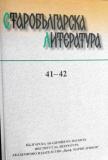Света гора в про- и антивизантийския сюжет в българската култура през ХVІІІ–ХІХ в.
The Role of Mount Athos in Constructing the Pro- and Anti-Byzantium Story-Line in the Context of the Nineteenth-Century Bulgarian National Revival Lit
Author(s): Kiril TopalovSubject(s): Cultural history
Published by: Институт за литература - БАН
Summary/Abstract: THE ROLE OF MOUNT ATHOS IN CONSTRUCTING THE PRO- AND ANTI-BYZANTIUM STORY-LINE IN THE CONTEXT OF THE NINETEENTH-CENTURY BULGARIAN NATIONAL REVIVAL LITERATURE KIRIL TOPALOV (SOFIA) (Summary) The clash between the image of the so-called “Byzantine Dream” – a reference to the idealistic desire for recreation and restoration of the independent and powerful Medieval Bulgarian State, and its factual historical representation in the context of the “Byzantine reality” of centuries-long domination of the Fener Orthodox Clergy over the Christian population in the Balkans, invariably conditioned the idiosyncratic path of construction of the pro- and anti-Byzantium story-line in the Bulgarian literature during the nineteenth-century National Revival. In the beginning of the 18th century the “spirit” of the New Age has had already appeared in Month Athos, radiating its powerful inspirational signals towards the reviving Balkan peoples, and offering them (also imposing on them) the unique for the Balkans model of pro- and anti-Byzantine civilizational abstraction. The “Byzantine Dream” represents the construction of the first conceptual nation-building image on the Balkans. This nation-building and civilizational signal originated from Month Athos by no accident: despite the fact that the monasteries on Month Athos peninsula were characterized by their clearly exhibited national idiosyncrasies during the centuries of submission to the authority of the Ottoman Empire they also found themselves united by their common experience of a sort of national complex which generally could be termed a “pro- and anti-Byzantine complex.” The validity and importance of this complex remain invariant regardless whether the origin of its “lost paradise” could be understood as the mere existence of the Byzantium Empire itself, or of its century-long rivalry with its biggest competitor for regional power – the Bulgarian Sate.
Journal: Старобългарска литература
- Issue Year: 2009
- Issue No: 41-42
- Page Range: 466-472
- Page Count: 7
- Language: Bulgarian
- Content File-PDF

